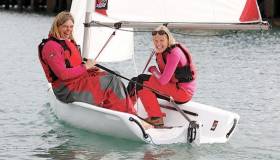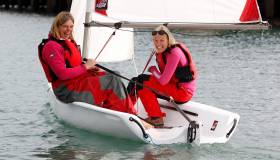Displaying items by tag: Try Sailing
ISA Try Sailing Programme 2016
ISA President, David Lovegrove on an enhanced get started initiative
Spring is traditionally the time when most sailors’ dreams turn with eager anticipation to the approaching season. However, the Irish Sailing Association (ISA) has used the dormant months to plan and prepare for the forthcoming season. Shortly we will be launching a number of exciting new initiatives which we hope will help increase participation and also improve the skills of existing sailors.
Following on the success of the pilot programme in 2015, the 2016 Try Sailing programme will see a greatly enhanced package of assistance available. This will include: a Try Sailing Bursary, the Schools Try Sailing Initiative for Primary and Secondary Schools as part of Active School Week, the Corporate Cup Training Programme for new sailors to try Keelboat and Cruiser racing, the Round Ireland Trophy, Volvo Cork Week Try Sailing Invitational Cup and the Scouting Ireland Try Sailing Programme. There will also be Sailability Programmes catering for those Clubs who specifically want to facilitate people with disabilities to enjoy sailing and Family Fun initiatives to encourage club members to bring their family along and try the full extent of what the Club has to offer. The Try Sailing Programme is supported by the ISA’s dedicated Try Sailing website and PR Toolkit and by the Regional Development Officers team who will be on hand to help each Club develop their own Participation Programme.
On the Training side, the new simplified Small Boat Sailing Scheme (SBSS) syllabus and Advanced Instructor Endorsement will be introduced for the 2016 season in conjunction with the electronic logbook and Sailing Passport. These changes are in response to the feedback to put more focus on the development of skills and the logging of time on the water than on the acquiring of certificates. The SBSS will now focus on introducing sailors to the sport, their acquisition of basic skills and encouraging them to experience a broad range of sailing activities. The higher level racing aspects will from now on form part of a new Coaching Programme aimed specifically at those who wish to progress further into competition.
The new Coaching Programme will help existing sailors improve their skills so as to get more enjoyment from their participation in racing. The scheme will be based around Clubs and Classes with the objectives of providing them with a framework to provide a high standard of affordable coaching for their members, the creation of training structures to develop the pool of suitable coaches and the provision of course materials, aids and mentoring to assist this pool of qualified coaches. The objective of this is to help those sailors at club or class level who are not part of the ISA Performance activities.
We will be assisting Classes and Clubs with the introduction of the programme and running a number of pilot projects during the season and look forward to hearing from Classes and Clubs wishing to be involved.
This time of year is also the time of conferences. The Cruising conference was held in Howth Yacht Club on 20 February and was a sell-out success. We were fortunate in having some top class speakers who delivered excellent presentations. The main priority for the representation policy group is the ongoing issue which is causing frustration to many cruising sailors, and that is the current lack of a statutory registration system for small craft. The ISA will continue to lobby hard to try and speed up the process to establish the registration system for pleasure craft. Other areas being addressed include the passenger boat regulations which continue to restrict the activities of our cruising schools. The tax on green diesel and the foreshore licensing issues are also on the policy group's agenda.
The race officials held their conference on 28 February. It was an interesting event with Anthony O’Leary giving the “view from the tiller”. This is always a fascinating session as it gives race officials first–hand feedback of what sailors are looking for in race management.
The new website, which is focused on how the ISA can assist clubs and classes in improving their range of services to their members, is divided into four sections, which reflect the main thrust of ISA activities under the Strategic Plan. The four areas are: Try Sailing, Racing, Cruising and Training. The site will undergo further development in the coming months.
So with all this activity taking place, it only remains for me to wish you well in your preparations for the new season and hope that we all have fair weather.
ISA 'Try Sailing' Initiative Aims to Encourage New Sailors
The Irish Sailing Association’s development of the “Try Sailing” programme for 2016 moves towards fresh action tomorrow with confirmation of a series of initiatives based on an out-reach approach by every form of sailing writes W M Nixon.
“Try Sailing” aims to grow further the policy of putting clubs in contact with potential sailing enthusiasts, while encouraging clubs to recognise that they have to provide a welcoming and hands-on attitude to the management of new groups, and their continuing mentoring as they move further into the worlds of boats.
In recent months – right through some of the worst periods of winter storms, as it happens – the ISA’s specialised Access & Participation Policy Group has been holding meetings in several locations to hear local views and see how best to move the programme forward. The group is co-ordinated by the ISA’s Western Region Development Officer Ciaran Murphy, who is based on the northwest shore of Galway Bay, and he brought together key administrative and teaching talent from many parts of Ireland.
During its research and planning phase, the APPG has included Muriel Rumball of the Irish National Sailing School in Dun Laoghaire, round the world voyager and former dinghy champion Pat Murphy of Sutton and Howth, who has tirelessly worked throughout his long sailing career in encouraging people afloat to enjoy sailing with the emphasis on enjoyment, Pierce Purcell from the southeast corner of Galway Bay who has made remarkable strides in improving communications and mutual support among sailors at every level on the western seaboard, and ISA President David Lovegrove, who has been and continues to be involved in the sport at every level both as a Race Officer to international standard, and as a participant who has from time to time built his own championship-winning racing dinghies.
Assembling such specialist talent was quite enough to be going along with, but getting them together at key stages in different venues during the stormiest winter on record provided an unexpected challenge, with Storm Imogen bringing a tree down on the railway line from Galway just as key members of the APPG were hurtling back eastwards on the Dublin express. But they escaped unscathed, and tomorrow’s soft launch of the programme on time shows that it will take more than Imogen to deflect this group now that they have their plans in shape.
Basically, Try Sailing 2016 will see a more thorough implementation of initiatives which have been introduced in trial form in recent years, doing so in the firm belief that you have to take your message to the people at least as much as you expect the people to come to your club if you’ve made it clear that all are welcome - and genuinely welcome at that. The offhand provision of facilities and training services are not what is required – this is something that has to come from the heart.
The sub-programmes which will be operating under the Try Sailing banner include:
• Women on Water
• Sailability
• Outreach to schools
• Corporate group approaches
• Specialist community group interactions.
The programme has been planned with special adaptations to suit the varying needs and requirements of what are, after all, widely disparate target “markets”, and as the Try Sailing initiative develops through the year, it will be closely monitored for fine tuning to meet any further needs which may not have come up in the first wave of research and analysis.

























































